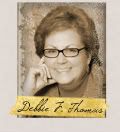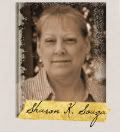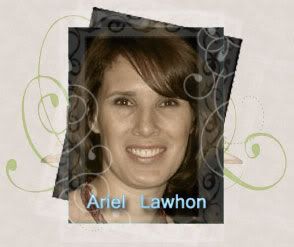 A novel, at its basic reduction, is a series of scenes cohesively
A novel, at its basic reduction, is a series of scenes cohesively  held together by narrative. Picture what we used to call a "granny quilt." It's a collection of crocheted circles or squares attached in rows by basic crochet stitches. Then the rows are connected by another basic stitch. When completed, it's a lovely work of art, that serves a useful purpose.
held together by narrative. Picture what we used to call a "granny quilt." It's a collection of crocheted circles or squares attached in rows by basic crochet stitches. Then the rows are connected by another basic stitch. When completed, it's a lovely work of art, that serves a useful purpose.Scenes in a novel are like those circles and squares. According to The Scene Book: A Primer for the Fiction Writer, by Sandra Scofield, "The scene is the most vivid and immediate part of the story, the place where the reader is the most emotionally involved, the part that leaves the reader with images and a memory of the action" (pg. 3).
That's not to say the narrative is unimportant. Remember, narrative is the stitch that holds the scenes together. It should be written with as much care as the scenes themselves, and should be as engaging as possible. One of my favorite authors is Jamie Langston Turner, who uses a lot of narrative in her novels. I know it's not everyone's cup of tea, but I enjoy her writing very much because her narrative is written with such care, and with such an engaging voice.
But back to scenes. Scenes are immediate. They happen in the present as you read them. Scenes are mini-stories, self-contained, each with a beginning, middle and end. Each scene should contain new and pertinent information, should have a degree of tension, and most importantly, should move the story along. If a scene doesn't accomplish these things it should be re-written with those goals in mind, or if it's entirely superfluous it should be cut altogether. Elizabeth George, in Write Away, has this to say: "Be careful that the scene adds something necessary to the story's development: information, revelation, discovery, sudden change" (pg. 139).
The middle section of a novel is most vulnerable to bogging down the story. If you find your WIP falling victim to a sagging middle, evaluate the story, scene by scene. Is the scene itself tight, adding ever-increasing tension, and moving the story forward? Are the stakes raised with each succeeding scene, resolutely moving toward the climax? If not, re-work your scenes until they are. And if they can't be rewritten to that end, don't hesitate to cut them. "Each scene has a dilemma or a pressure on the POV character, and it is sufficient in its importance that it drives the action and feeling" (The Scene Book, pg. 60).
The antagonist should oppose the protagonist at every turn. The tautness of a scene can be likened to a cord held tightly at one end by the protagonist, and held just as tightly at the other end by the antagonist. One is always pulling against the other. That's what creates the type of tension that makes a book impossible to put down. Tension is built by "holding back information from the reader; introducing questions and then intensifying concerns about the answers; making the reader uneasy about the harmony of relationships" (The Scene Book, pg. 73). Sol Stein in Stein on Writing acknowledges that, "Our instinct as human beings is to provide answers, to ease tension. As writers our job is the opposite, to create tension and not dispel it immediately ... and when it comes to moments of tension, to stretch them out as long as possible" (pg. 106). Elizabeth George says, "And make that conflict rise, as all good conflict should. Don't jump into it with people yelling, screaming, shooting, and having swords drawn" (pg. 139). Stein adds this great piece of writing advice: "The most important moment of tension in a novel is its first use, which should be as close to the beginning of the book as possible. It puts the writer in charge of the reader's emotions" (pg. 107), and that is an important goal of the author.
The narrative between scenes gives the reader a moment to catch her breath. So it too serves an important part. But remember, the narrative shouldn't be expendable, but should be as engaging as any scene.
I'm the type of reader who doesn't ever skip over anything in a novel. I read every word, every time. I love being rewarded with scenes that draw me in and raise my heart rate. And I love narrative that takes me back to level ground without a sense of let-down.
There's so much more to writing scenes that keep the middle from sagging. I recommend all three of these books, but especially the great little primer by Sandra Scofield.
What problems do you run into in the middle section of your novel? How do you evaluate the problems, and what do you do to resolve them?
That's not to say the narrative is unimportant. Remember, narrative is the stitch that holds the scenes together. It should be written with as much care as the scenes themselves, and should be as engaging as possible. One of my favorite authors is Jamie Langston Turner, who uses a lot of narrative in her novels. I know it's not everyone's cup of tea, but I enjoy her writing very much because her narrative is written with such care, and with such an engaging voice.
But back to scenes. Scenes are immediate. They happen in the present as you read them. Scenes are mini-stories, self-contained, each with a beginning, middle and end. Each scene should contain new and pertinent information, should have a degree of tension, and most importantly, should move the story along. If a scene doesn't accomplish these things it should be re-written with those goals in mind, or if it's entirely superfluous it should be cut altogether. Elizabeth George, in Write Away, has this to say: "Be careful that the scene adds something necessary to the story's development: information, revelation, discovery, sudden change" (pg. 139).
The middle section of a novel is most vulnerable to bogging down the story. If you find your WIP falling victim to a sagging middle, evaluate the story, scene by scene. Is the scene itself tight, adding ever-increasing tension, and moving the story forward? Are the stakes raised with each succeeding scene, resolutely moving toward the climax? If not, re-work your scenes until they are. And if they can't be rewritten to that end, don't hesitate to cut them. "Each scene has a dilemma or a pressure on the POV character, and it is sufficient in its importance that it drives the action and feeling" (The Scene Book, pg. 60).
The antagonist should oppose the protagonist at every turn. The tautness of a scene can be likened to a cord held tightly at one end by the protagonist, and held just as tightly at the other end by the antagonist. One is always pulling against the other. That's what creates the type of tension that makes a book impossible to put down. Tension is built by "holding back information from the reader; introducing questions and then intensifying concerns about the answers; making the reader uneasy about the harmony of relationships" (The Scene Book, pg. 73). Sol Stein in Stein on Writing acknowledges that, "Our instinct as human beings is to provide answers, to ease tension. As writers our job is the opposite, to create tension and not dispel it immediately ... and when it comes to moments of tension, to stretch them out as long as possible" (pg. 106). Elizabeth George says, "And make that conflict rise, as all good conflict should. Don't jump into it with people yelling, screaming, shooting, and having swords drawn" (pg. 139). Stein adds this great piece of writing advice: "The most important moment of tension in a novel is its first use, which should be as close to the beginning of the book as possible. It puts the writer in charge of the reader's emotions" (pg. 107), and that is an important goal of the author.
The narrative between scenes gives the reader a moment to catch her breath. So it too serves an important part. But remember, the narrative shouldn't be expendable, but should be as engaging as any scene.
I'm the type of reader who doesn't ever skip over anything in a novel. I read every word, every time. I love being rewarded with scenes that draw me in and raise my heart rate. And I love narrative that takes me back to level ground without a sense of let-down.
There's so much more to writing scenes that keep the middle from sagging. I recommend all three of these books, but especially the great little primer by Sandra Scofield.
What problems do you run into in the middle section of your novel? How do you evaluate the problems, and what do you do to resolve them?





























